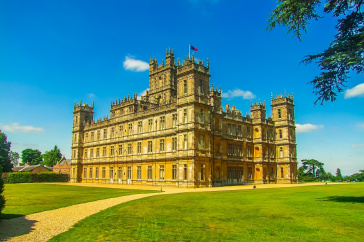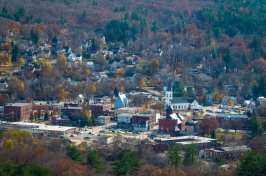The University of New Hampshire inspires innovation and transforms lives in our state, nation and world. More than 16,000 students from all 50 states and 71 countries engage with an award-winning faculty in top-ranked programs in business, engineering, law, health and human services, liberal arts and the sciences across more than 200 programs of study. A Carnegie Classification R1 institution, UNH partners with NASA, NOAA, NSF and NIH, and received $260 million in competitive external funding in FY21 to further explore and define the frontiers of land, sea and space.
UNH Research Pulls Back the Veil on Historical Portrayal of Downton Abbey

Highclere Castle, the setting for Downton Abbey. Stock Photo.
DURHAM, N.H.— Ask any “Downton Abbey” fan about the wildly popular historical television drama and they will wistfully reminisce about being whisked away to a more genteel and elegant time in post-Edwardian England. With a majestic castle as the backdrop and actors adorned in lavish costumes, audiences were immersed into life as it was in the early 1900’s. Or, were they? A historian at the University of New Hampshire takes a closer look at the beloved show to reveal that it may have been preserving history not as it actually was but as fans believe it ought to have been.
“While historical objects, styles and period antiques were meticulously curated to ensure the authenticity of the show, the behavior and values portrayed by the characters in 'Downton' had a more modern slant,” said Nicoletta Gullace, associate professor of history at UNH, who studies 20th century British history. “Life was hard and gritty in the early 1900’s. So the show’s producers created a safe and more palatable experience to satisfy today’s viewer by airbrushing over some of the ugliness including severe poverty, human rights abuses, bankruptcy, rampant sexism, and just how dirty it was to live during that period.”
In her study, recently published in the Journal of British Cinema and Television, Gullace, a “Downton Abbey” fan herself, acknowledges that the award-winning PBS drama was a fairytale of wealth and elegance driven by wonderful writing and intriguing plots. But as a historian, who is often invited to speak about “Downton Abbey,” she notes that the show fabricates a more ‘habitable past’ that celebrates the rich and conservative while not offending today’s audiences. She cites examples like unlikely class interactions between servants and masters, the tolerance of sexual and social outsiders and the unending kindness of the wealthy Crawleys toward people regardless of their rank.
“The drama did a remarkable job of getting people excited about history in a way real history usually can’t,” said Gullace. “Most Americans don’t really know that much about British history so this introduced a whole new audience to this time period. But academic scholars often ask, to what degree were they learning the real history?”
Gullace says that the magic of “Downton Abbey” was the way it created a fictional past that seemed so ‘real’ that viewers could imagine themselves living there. She points to the relatable feminist nature of many of the female characters. Each of the young women exhibited a plucky feminism – Sybil through women’s suffrage, Edith with her newspaper and Mary by asserting sexual autonomy. However, they aren’t really representative of the sexual mores of the time and would have been extremely rare. But to draw in American viewers, mostly women between 35 and 49, “Downton Abbey” carefully constructed a more desirable past, which also includes modern behaviors where women enjoy opportunities for autonomy and self-fulfillment, even though the most important ones center on the quest for true love.
Gullace acknowledges that it is hard to control any interpretation of the past in most creative mediums, especially for a show with such a passionate audience that craves a period that they can relate to. She points out that “Downton Abbey” is not any different from other living museums, such as New England’s Old Sturbridge Village, or any historical re-enactments that take place on battlefields across the United States. Their popularity, just like with “Downton Abbey,” shows the public craves learning about history but wants it to be fun.
Latest News
-
Research Finds Rural Americans Carry Heavy Burden Accessing Social Security Benefits and InformationMarch 27, 2025
-
March 25, 2025
-
March 17, 2025
-
March 12, 2025
-
February 19, 2025















































